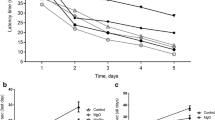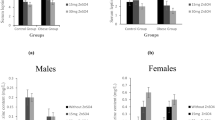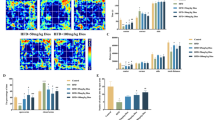Abstract
Objective
To determine whether B vitamin treatment was sufficient to reduce cognitive impairment associated with high-fat diets in rats and to modulate transketolase (TK) expression and activity.
Methods
To test this, we separated 50 rats into five groups that were either fed a standard chow diet (controls) or a high-fat diet (experimental groups H0, H1, H2, and H3). H0 group animals received no additional dietary supplementation, while H1 group animals were administered 100 mg/kg body weight (BW) thiamine, 100 mg/kg BW riboflavin, and 250 mg/kg BW niacin each day, and group H2 animals received daily doses of 100 mg/kg BW pyridoxine, 100 mg/kg BW cobalamin, and 5 mg/kg BW folate. Animals in the H3 group received the B vitamin regimens administered to both H1 and H2 each day.
Results
Over time, group H0 exhibited greater increases in BW and fat mass relative to other groups. When spatial and memory capabilities in these animals were evaluated via conditioned taste aversion (CTA) and Morris Water Maze (MWM), we found B vitamin treatment was associated with significant improvements relative to untreated H0 controls. Similarly, B vitamin supplementation was associated with elevated TK expression in erythrocytes and hypothalamus of treated animals relative to those in H0 (P<0.05).
Conclusion
Together, these findings suggest B vitamin can modulate hypothalamic TK activity to reduce the severity of cognitive deficits in a rat model of obesity. As such, B vitamin supplementation may be a beneficial method for reducing cognitive dysfunction in clinical settings associated with high-fat diets.
Similar content being viewed by others
References
Lee BY, Bartsch SM, Mui Y, et al. A systems approach to obesity. Nutr Rev, 2017, 75(1):94–106
Eskelinen MH, Ngandu T, Helkala EL, et al. Fat intake at midlife and cognitive impairment later in life: a population-based CAIDE study. Int J Geriatr Psychiatry, 2008,23(7):741–747
Cordner ZA, Tamashiro KLK. Effects of high-fat diet exposure on learning & memory. Physiol Behav, 2015,152:363–371
Smith E, Hay P, Campbell L, et al. A review of the association between obesity and cognitive function across the lifespan: implications for novel approaches to prevention and treatment. Obes Rev, 2011,12(9):740–755
Banks WA, Coon AB, Robinson SM, et al. A Triglycerides induce leptin resistance at the blood-brain barrier. Diabetes, 2004,53(5):1253–1260
Davidson TL, Hargrave SL, Swithers SE, et al. Interrelationships among diet, obesity and hippocampaldependent cognitive function. Neuroscience, 2013,253: 110–122
Xia SF, Xie ZX, Qiao Y, et al. Differential effects of quercetin on hippocampus-dependent learning and memory in mice fed with different diets related with oxidative stress. Physiol Behav, 2015,138:325–331
Camer D, Yu Y, Szabo A, et al. Bardoxolone methyl prevents highfat diet-induced alterations in prefrontal cortex signalling molecules involved in recognition memory. Prog Neuro-Psychopharmacol Biol Psychiatry, 2015,59:68–75
Bruggeman EC, Garretson JT, Wu R, et al. Neuronal Dnmt1 Deficiency Attenuates Diet-Induced Obesity in Mice. Endocrinology, 2018,159(1):145–162
McMenamin CA, Clyburn C, Browning KN. High-Fat Diet During the Perinatal Period Induces Loss of Myenteric Nitrergic Neurons and Increases Enteric Glial Density, Prior to the Development of Obesity. Neuroscience, 2018,393:369–380
Staubo SC, Aakre JA, Vemuri P, et al. Mediterranean diet, micronutrients and macronutrients, and MRI measures of cortical thickness. Alzheimers Dement, 2017,13(2):168–177
Ozawa M, Shipley M, Kivimaki M, et al. Dietary pattern, inflammation and cognitive decline: the Whitehall II prospective cohort study. Clin Nutr, 2017,36(2):506–512
Deshpande GP, Patterton HG, Faadiel EM. The human transketolase-like proteins TKTL1 and TKTL2 are bona fide transketolases. BMC Struct Biol, 2019,19(1):2
Dhir S, Tarasenko M, Napoli E, et al. Neurological, Psychiatric, and Biochemical Aspects of Thiamine Deficiency in Children and Adults. Front Psychiatry, 2019,10:207
Calderón-Ospina CA, Nava-Mesa MO. B vitamins in the nervous system: Current knowledge of the biochemical modes of action and synergies of thiamine, pyridoxine, and cobalamin. CNS Neurosci Ther, 2020,26(1):5–13
Yu LX, Chen Y, Xu Y, et al. D-ribose is elevated in T1DM patients and can be involved in the onset of encephalopathy. Aging, 2019,11(14):4943–4969
Monireh D. A quick look at biochemistry: Carbohydrate metabolism. Clin Biochem, 2013,46(15):1339–1352
Park YJ, Choe SS, Sohn JH, et al. The role of glucose-6- phosphate dehydrogenase in adipose tissue inflammation in obesity. Adipocyte, 2017,6(2):147–153
Pérez-Pérez R, García-Santos E, Ortega-Delgado FJ, et al. Attenuated metabolism is a hallmark of obesity as revealed by comparative proteomic analysis of human omental adipose tissue. J Proteomics, 2012,75(3):783–795
Peral B, Camafeita E, Fernandez-Real JM, et al. Tackling the human adipose tissue proteome to gain insight into obesity and related pathologies. Expert Rev Proteomics, 2009,6(4):353–361
Maguire D, Talwar D, Shiels PG, et al. The role of thiamine dependent enzymes in obesity and obesity related chronic disease states: A systematic review. Clin Nutr ESPEN, 2018,25:8–17
Zheng Y, Ma AG, Zheng MC, et al. B Vitamins Can Reduce Body Weight Gain by Increasing Metabolismrelated Enzyme Activities in Rats Fed on a High-Fat Diet. Curr Med Sci, 2018,38(1):174–183
Heap LC, Pratt OE, Ward RJ, et al. Individual susceptibility to Wernicke-Korsakoff syndrome and alcoholism-induced cognitive deficit: impaired thiamine utilization found in alcoholics and alcohol abusers. Psychiatr Genet, 2002,12(4):217–224
Luong KV, Nguyen LT. Role of Thiamine in Alzheimer’s Disease. Am J Alzheimers Dis Other Demen, 2011, 26(8):588–598
Day GS, Campo CM. Wernicke encephalopathy: a medical emergency. CMAJ, 2014,186(8):295
Dakshinamurti K. Vitamins and their derivatives in the prevention and treatment of metabolic syndrome diseases (diabetes). Can J Physiol Pharmacol, 2015,93(5):355–362
Fenech M. Vitamins Associated with Brain Aging, Mild Cognitive Impairment, and Alzheimer Disease: Biomarkers, Epidemiological and Experimental Evidence, Plausible Mechanisms, and Knowledge Gaps. Adv Nutr, 2017,8(6):958–970
McCleery J, Abraham RP, Denton DA, et al. Vitamin and mineral supplementation for preventing dementia or delaying cognitive decline in people with mild cognitive impairment. Cochrane Database Syst Rev, 2018,11(11):CD011905
Maiese K, Chong ZZ, Hou J, et al. The vitamin nicotinamide: translating nutrition into clinical care. Molecules (Basel, Switzerland), 2009,14(9):3446–3485
Agnew-Blais JC, Wassertheil-Smoller S, Kang JH, et al. Folate, vitamin B-6, and vitamin B-12 intake and mild cognitive impairment and probable dementia in the Women’s Health Initiative Memory Study. J Acad Nutr Diet, 2015,115(2):231–241
Singh R, Kanwar SS, Sood PK, et al. Beneficial Effects of Folic Acid on Enhancement of Memory and Antioxidant Status in Aged Rat Brain. Cell Mol Neurobiol, 2010,31(1):83–91
Auberval N, Dal S, Bietiger W, et al. Metabolic and oxidative stress markers in Wistar rats after 2 months on a high-fat diet. Diabetol Metab Syndr, 2014,6:130
Marques C, Meireles M, Norberto S, et al. High-fat dietinduced obesity rat model: a comparison between Wistar and Sprague-Dawley Rat. Adipocyte, 2016,5(1):11–21
Reeves PG, Nielsen FH, Fahey GC, et al. AIN-93 Purified Diets for Laboratory Rodents: Final Report of the American Institute of Nutrition Ad Hoc Writing Committee on the Reformulation of the AIN-76A Rodent Diet. J Nutr, 1993,123(11):1939–1951
Tanaka T, Kono T, Terasaki F, et al. Thiamine prevents obesity and obesity-associated metabolic disorders in OLETF rats. J Nutr Sci Vitaminol (Tokyo), 2010,56(6): 335–346
Babaei-Jadidi R, Karachalias N, Ahmed N, et al. Prevention of Incipient Diabetic Nephropathy by High- Dose Thiamine and Benfotiamine. Diabetes, 2003,52(8):2110–2120
Kennedy DO. B Vitamins and the Brain: Mechanisms, Dose and Efficacy-A Review. Nutrients, 2016,8(2):68
Chandler P, Viana J, Oswald K, et al. Feeding response to melanocortin agonist predicts preference for and obesity from a high-fat diet. Physiol Behav, 2005,85(2):221–230
Chambers KC. Conditioned taste aversions. World J Otorhinolaryngol Head Neck Surg, 2018, 4(1): 92–100
Morris R. Developments of a water-maze procedure for studying spatial learning in the rat. J Neurosci Methods, 1984,11(1):47–60
Vorhees CV, Williams MT. Morris water maze: procedures for assessing spatial and related forms of learning and memory. Nat Protoc, 2006,1(2):848–858
Bunyan J, Murrell EA, Shah PP. The induction of obesity in rodents by means of monosodium glutamate. Br J Nutr, 1976,35(1):25–39
Chamberlain BR, Buttery JE, Pannall PR. A Stable Reagent Mixture for the Whole Blood Transketolase Assay. Ann Clin Biochem, 1966,33(4):352–354
Bates CJ. Vitamin analysis. Ann Clin Biochem, 1977,34(6):599–626
Mahalle N, Kulkarni MV, Garg MK, et al. Vitamin B12 deficiency and hyperhomocysteinemia as correlates of cardiovascular risk factors in Indian subjects with coronary artery disease. J Cardiol, 2013,61(4):289–294
Satyanarayana A, Balakrishna N, Pitla S, et al. Status of B-vitamins and homocysteine in diabetic retinopathy: association with vitamin-B12 deficiency and hyperhomocysteinemia. PLoS ONE, 2011, 6(11):e26747
Ma F, Wu T, Zhao J, et al. Folic acid supplementation improves cognitive function by reducing the levels of peripheral inflammatory cytokines in elderly Chinese subjects with MCI. Sci Rep, 2016,6:37486
Winkvist A, Bertz F, Ellegard L, et al. Metabolic risk profile among overweight and obese lactating women in Sweden. PLoS ONE, 2013,8(5):e63629
Pérez-Pérez R, Garcia-Santos E, Ortega-Delgado FJ, et al. Attenuated metabolism is a hallmark of obesity as revealed by comparative proteomic analysis of human omental adipose tissue. J Proteomics, 2012,75(3):783–795
Kraus D, Yang Q, Kong D, et al. Nicotinamide N-methyltransferase knockdown protects against dietinduced obesity. Nature, 2014,508(7495):258–262
Kanoski SE. Cognitive and neuronal systems underlying obesity. Physiol Behav, 2012,106(3):337–344
Stranahan AM, Cutler RG, Button C, et al. Diet-induced elevations in serum cholesterol are associated with alterations in hippocampal lipid metabolism and increased oxidative stress. J neurochem, 2011,118(4): 611–615
Cook RL, O’Dwyer NJ, Donges CE, et al. Relationship between Obesity and Cognitive Function in Young Women: The Food, Mood and Mind Study. J Obes, 2017,2017:5923862
Stranahan AM. Models and mechanisms for hippocampal dysfunction in obesity and diabetes. Neuroscience, 2015,309:125–139
Valcarcel-Ares MN, Tucsek Z, Kiss K, et al. Obesity in Aging Exacerbates Neuroinflammation, Dysregulating Synaptic Function-Related Genes and Altering Eicosanoid Synthesis in the Mouse Hippocampus: Potential Role in Impaired Synaptic Plasticity and Cognitive Decline. J gerontol A Biol Sci Med Sci, 2019,74(3):290–298
Pancani T, Anderson KL, Brewer LD, et al. Effect of high-fat diet on metabolic indices, cognition, and neuronal physiology in aging F344 rats. Neurobiol Aging, 2013,34(8)1977–1987
Spector AC, Breslin P, Grill HJ. Taste reactivity as a dependent measure of the rapid formation of conditioned taste aversion: a tool for the neural analysis of tastevisceral associations. Behav Ncurosci, 1988,102(6):942–952
Smith E, Hay P, Campbell L, et al. A review of the association between obesity and cognitive function across the lifespan: implications for novel approaches to prevention and treatment. Obes Rev, 2011,12(9):740–755
Mostafa DG, Satti HH, Khaleel EF, et al. A high-fat diet rich in corn oil exaggerates the infarct size and memory impairment in rats with cerebral ischemia and is associated with suppressing osteopontin and Akt, and activating GS3Kβ, iNOS, and NF-Kb. J Physiol Biochem, 2020,76(3):393–406
Miller AA, Spencer SJ. Obesity and neuroinflammation: a pathway to cognitive impairment. Brain Behav Immun, 2014, 42:10–21
Pittman DW, Smith KR, Crawley ME, et al. Orosensory Detection of Fatty Acids by Obesity-Prone and Obesity-Resistant Rats: Strain and Sex Differences. Chem Senses, 2008,33(5):449–460
Ying Z, Byun HR, Meng Q, et al. Biglycan gene connects metabolic dysfunction with brain disorder. Biochim Biophys Acta Mol Basis Dis, 2018,1864(12):3679–3687
Kennedy DO. B Vitamins and the Brain: Mechanisms, Dose and Efficacy-A Review. Nutrients, 2016,8(2): 68
Fan S, Zheng Y, Liu X, et al. Curcumin-loaded PLGAPEG nanoparticles conjugated with B6 peptide for potential use in Alzheimer’s disease. Drug Deliv, 2018,25(1):1091–1102
Racek J, Rusnakova H, Trefil L, et al. The influence of folate and antioxidants on homocysteine levels and oxidative stress in patients with hyperlipidemia and hyperhomocysteinemia. Physiol Res, 2005,54(1):87–95
Kang WB, Chen YJ, Lu DY, et al. Folic acid contributes to peripheral nerve injury repair by promoting Schwann cell proliferation, migration, and secretion of nerve growth factor. Neural Regener Res, 2019,14(1):132–139
Sang S, Pan X, Chen Z, et al. Thiamine diphosphate reduction strongly correlates with brain glucose hypometabolism in Alzheimer’s disease, whereas amyloid deposition does not. Alzheimers Res Ther, 2018,10(1):26
Alexander-Kaufman K, Harper C. Transketolase: Observations in alcohol-related brain damage research. Int J Biochem Cell Biol, 2009,41(4):717–720
Zhao Y, Wu Y, Hu H, et al. Downregulation of transketolase activity is related to inhibition of hippocampal progenitor cell proliferation induced by thiamine deficiency. BioMed Res Int, 2014,2014:572915
Author information
Authors and Affiliations
Corresponding author
Additional information
This study was supported by a grant from Medical Scientific Research Foundation of Guangdong Province, China (No. A2018282).
Rights and permissions
About this article
Cite this article
Zheng, Y., Chen, Zy., Ma, Wj. et al. B Vitamins Supplementation Can Improve Cognitive Functions and May Relate to the Enhancement of Transketolase Activity in A Rat Model of Cognitive Impairment Associated with High-fat Diets. CURR MED SCI 41, 847–856 (2021). https://doi.org/10.1007/s11596-021-2456-5
Received:
Accepted:
Published:
Issue Date:
DOI: https://doi.org/10.1007/s11596-021-2456-5




